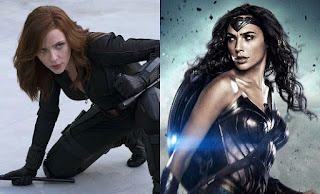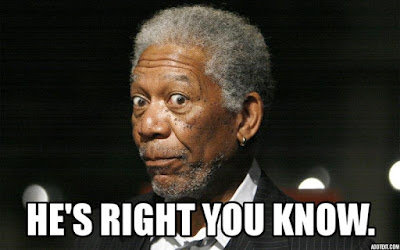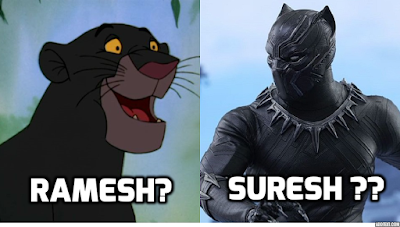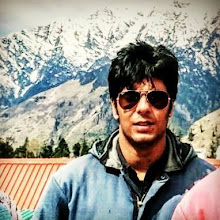<WARNING : SPOILERS AHEAD>
Oh Captain! My Captain!! I’m on
#TeamIronMan. Yeah, since the latter half of the past year, this and the
#teamCap hashtag has been trending on the entire bloody internet. Way to build
up steam for the grand opening. With memes, jokes, tweets and the hotlot making
the rounds, Captain America: Civil War opened to some roaring fanfare, albeit
late, in the Indian market.
Through this piece, I am not
trying to appraise the Russo brothers in any out-of-the-way manner. I believe
the tweets and facebook posts have done enough of that. Whatever I wish to
state, and any opinions regarding the Russos, shall be substantiated through the elucidations of this post.
Civil War is the most serious and matured entry of Marvel till date (after Jessica Jones and Daredevil), in all fronts possible. After the events of Avengers: Age of Ultron, and a mission against Crossbones that went sideways, the Avengers are obligated to sign the Sokovia accords, an agreement which would take away their autonomy, and screen the situations that require their presence. This divides the team into two factions, one pro-accords and the other against, led by Tony Stark and Steve Rogers respectively. Add to that, a conspiracy by a victim of the Avenger’s past exploits and the presence of Bucky Barnes a.k.a. the Winter Soldier, worsens the team fabric.
Civil War is the typical Marvel
film, with more age and more wisdom added to the mix, despite defaulting in
numerous instances in the rather comical slapstick-ish way typical of
Marvel (Note: Usage of the word ‘typical’ twice should denote the weight of
this statement). The film wins sweet points in performances, story (most of it
at least), character development, and the political realism that it enters.
 The film is basically centering
around the polar change in the outlooks of Captain America and Iron Man. Cap’n
is still the same old ‘Murican soldier, ‘who probably can’t live without a war’
as so aptly put by Ultron, but time and experience have brought out a new facet
of his patriotism to the forefront: one by which he is ready to forsake any
chains of order (which he used to be the embodiment of) to be able to protect
the Earth as per his self-righteous terms, as well as his old friend who’s
apparently innocent as his activities were being controlled by the rogue
organisation HYDRA. We witness a metamorphosis in Rogers’ identity, from a
soldier, to a symbol of structure and order, to an insurgent who believes that
giving away the Avengers’ autonomy under Oversight would result in the failure
of the very purpose of their existence.
The film is basically centering
around the polar change in the outlooks of Captain America and Iron Man. Cap’n
is still the same old ‘Murican soldier, ‘who probably can’t live without a war’
as so aptly put by Ultron, but time and experience have brought out a new facet
of his patriotism to the forefront: one by which he is ready to forsake any
chains of order (which he used to be the embodiment of) to be able to protect
the Earth as per his self-righteous terms, as well as his old friend who’s
apparently innocent as his activities were being controlled by the rogue
organisation HYDRA. We witness a metamorphosis in Rogers’ identity, from a
soldier, to a symbol of structure and order, to an insurgent who believes that
giving away the Avengers’ autonomy under Oversight would result in the failure
of the very purpose of their existence.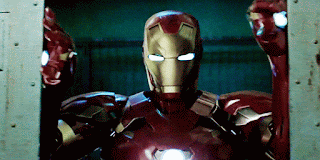 On the other hand, Tony Stark
faces a completely new angle in life. We see a bit of the old Tony return from
the first Iron Man film, who after facing the ground reality of his weapons
industry had shut it down in hopes of making the world a better place. After
witnessing the aftermath of New York and Sokovia, Tony starts doubting the very
autonomy that Rogers seems to uphold, and believes that the Avengers, like any
other government entity require some sort of regulation, and this signs to the
accords. Unlike the usual Tony Stark that the Marvel films have us used to,
Civil War presents us with a much more calculative, much more pragmatic Tony,
one who is ready to adapt to survive as well as develop, as an individual and a
team.
On the other hand, Tony Stark
faces a completely new angle in life. We see a bit of the old Tony return from
the first Iron Man film, who after facing the ground reality of his weapons
industry had shut it down in hopes of making the world a better place. After
witnessing the aftermath of New York and Sokovia, Tony starts doubting the very
autonomy that Rogers seems to uphold, and believes that the Avengers, like any
other government entity require some sort of regulation, and this signs to the
accords. Unlike the usual Tony Stark that the Marvel films have us used to,
Civil War presents us with a much more calculative, much more pragmatic Tony,
one who is ready to adapt to survive as well as develop, as an individual and a
team.
The Stark-Rogers turmoil couldn’t
be a more beautiful picture. Over their years together, the Cap’n and Iron Man
have reached a spot, where their collective ideology has become similar, with a
few still opposing facets. It’s like their 2 personalities trapped in 1 body,
hashing it out to see whose definition of right and wrong is valid.
Point of interest: In terms of story structure, one
can actually spot some striking similarities between Civil War and Batman v Superman: Dawn of Justice –
Both Tony Stark and Bruce Wayne have gained
considerable experience over their years of practiced vigilantism (Tony lesser than Bruce though) (Both the experience and the v, that has led them to become rather precautious,
especially with their superior counterparts i.e. Rogers and Clark Kent
respectively.

Both the films are building up to a master plan
on a galactic level by an alien overlord, i.e. Thanos with his infinity stones,
and Darkseid as was seen in Batman’s nightmare (for those who couldn’t catch
up).
Both Iron Man and Batman’s
parents, specifically their mothers, are key parameters governing the turn of
events in both the movies.
And last but not the least, both
films feature a deadly damsel having a mysterious past, bridging the two lead
characters (Black Widow and Wonder Woman).
Notwithstanding what’s about to
follow, Civil War was a great entry by the Russo brothers, who already had the
gem that was Captain America: The Winter Soldier in their kitty. Many raised the question that 'Why is this a Captain America film and not an Avengers film? What's the difference?' The difference lies in the principal point of view that the story piggybacks upon, one that is professed through the eyes of a man forged from raw patriotism, compassion, and self-righteousness in the face of harrowing odds
Some points in
this movie though, could really get red spots in the otherwise cool film.
Leading the array is the famous Airport fight sequence between #TeamCap and
#TeamIronMan at Leipzig.
Don’t get me wrong, it was a good
fight. A damn good choreographed one, at that. But in the otherwise serious,
mature presentation that Civil War was, and is expected to be considering it’s
a ‘Captain America’ movie and not an Avengers movie, it was rather shoddy.
Why in the world are Spiderman
and Ant-Man being pulled into a fight that doesn’t even concern them remotely? Scott
Lang is a father trying to wean off his criminal past and paying child support
for his incredibly sweet little daughter, and somehow he found that being in a
brawl at a German airport (which is completely uninhabited, God knows why)
fighting alongside a 70 year old science experiment is the solution to all his
problems. And he wasn’t even being paid!!!
Same goes for Spiderman, but
truly he wasn’t to blame. Really, Peter Parker’s a 19-year old kid. If I can
shoot web out my hands and sorta kick ass, and Tony Stark offers me a nice
suit, even I would accept the ticket to Germany, which begs the question: what
the hell is wrong with Anthony Stark? You’re bringing a high school kid into
your private skirmishes?? Just because he shoots white stuff that has high
tensile strength??? Damn, and here I am writing paragraphs on how the guy’s
matured and everything. WAY TO GO, TONY! <sic>
Keeping the rest of the character lineup aside, I must point out
the elephant in the room that is Civil War - Black Panther. Possessing the
quintissential anti-hero persona, Black Panther scratches and claws his way
into Cooldom. I suppose it’s become a norm of sorts: You have an antihero? You
want him to be cool and kick-ass? Give him claws and kitten that bitch up!
Possibly the next best antihero after Wolverine and Deadpool, and the next
coolest cat after Wolverine and Bagheera, I really don’t see why anyone
wouldn’t like him. If anyone doesn’t though, that’s their problem. And his. And
his claws' <RED ALERT>.
The typical Marvel film is guilty
pleasure, the sort that even most critics aren’t able to run away from. Captain
America: Civil War is that and more. Much more (This sounds bad, but is
actually good). Through Civil War, Marvel proves its adaptability as well as
its conviction, by creating a pragmatic, realistic story around the same
goofball, never-seeming-that-serious superheroes, pitting them in a scenario
involving real world problems like international law, sovereignty, treaties and
agreements; problems that the earlier movies seemed to have a childish
disregard for, without completely straying away from its comic spirit by
providing a darker, more pessimistic portrayal. We saw how THAT worked out for
DoJ (Not that I didn’t like it, but it sure is bad for business).
The studio has also tried to set the film as a launchpad for future members of the Avengers' which may include a certain adamantium feline (rumours) (Control your breath), and though the intros may be a little fumbled up, it's actually turned out pretty good. Future sees good for all things MARVEL




